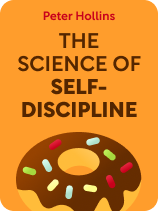

This article is an excerpt from the Shortform book guide to "The Science of Self-Discipline" by Peter Hollins. Shortform has the world's best summaries and analyses of books you should be reading.
Like this article? Sign up for a free trial here.
What’s emotional discipline? What tools can help you build self-control?
In The Science of Self-Discipline, Peter Hollins explains that taking a measured approach to developing discipline will make it sustainable. To develop a disciplined mindset, he offers a few strategies.
Continue reading for his four emotional discipline tools.
1. Motivate Yourself to Remain Disciplined
Hollins’s first emotional discipline tool is a motivational reason. According to Hollins, if you have a clear idea of what you want to achieve through discipline, it will motivate you to keep your healthy habits on track and persevere through challenging moments.
Hollins explains that there are three main categories of motivation: independence, excellence, and service. A motivating goal will relate to at least one of these categories.
1. Independence: This is a sense that you have the freedom to decide your actions. When you feel in control of your life and work, you’re motivated to be more engaged and productive.
2. Excellence: This is your innate desire to improve at things. When you feel motivated to get better at something, there’s practically no end to this drive because it’s impossible to be perfect at anything.
3. Service: This is the idea that your discipline will have a meaningful effect on the world. For example, if you believe that the smoothie shop you’re disciplined to save money for will bring joy and nutrition to your community, you’ll probably be more motivated to follow through with opening it than someone who is opening a business solely for personal profit.
Hollins says that it’s also important to set discipline goals that are realistic enough to achieve but challenging enough to motivate you. If you shoot too high and don’t attain your goal, you might be discouraged and give up. However, if your goal is too easy, you’ll likely get bored with it. So, set realistic goals with measurable checkpoints to give yourself a sense of accomplishment and progress toward your goal. By doing this, you’ll see that you’re capable of improving, which will motivate you to continue with enthusiasm. Consistent positive reinforcement will also give your brain time to develop new neural pathways and adjust to new patterns of behavior, which will help you sustain discipline more effectively in the long run.
To set realistic goals, reflect on your past successes and failures, being honest with yourself about what factors led you to succeed or fail. Then, set a new goal that you think you could push yourself to achieve.
2. Don’t Fight Your Impulses, Observe Them
Hollins says that if you fight your urges, it makes them last longer and grow stronger, which puts you at greater risk of succumbing to them. You probably already know this if anyone’s ever told you not to think about something. When you try to suppress a thought, your focus on that topic typically grows stronger. So, instead of suppressing your urges, allow yourself to experience them with an awareness that they’re temporary. Hollins explains that this will help you stop identifying with your emotions and give you a position of power over them, which allows them to pass more easily. One way to do this is to picture your urge as a passing storm that comes on strong and then fades away.
(Shortform note: Attempting to suppress our inner thoughts and urges isn’t a battle we typically win. This truth also applies to stress management. In The Upside of Stress, Kelly McGonigal explains that trying to avoid things that stress you out only reinforces your stress about those things and can even lead to new stresses. For example, if you avoid dating people because you fear you’re an inadequate partner, you’ll reinforce your negative belief about yourself. Additionally, you’ll deprive yourself of the support a loving partner can provide, or you may stress about missing out on experiences that partnerships provide. Instead, McGonigal explains that embracing stress helps you overcome it and even use it to your advantage.)
3. Remind Yourself That You’re Capable of Maintaining Discipline
Hollins emphasizes the importance of believing that you’re capable of maintaining discipline to reach your goals. To affirm your strength when you feel weak, remember these tips:
Practice the 40% Rule. Developed by Navy SEALs, this rule means that when you feel like you’ve reached your physical or mental limit amidst a challenge, you’ve only exerted about 40% of what you have left in the tank. The 40% rule is supported by evidence for the placebo effect, which is the influence our beliefs have on real-world outcomes. If you believe you have what it takes to maintain discipline—even when it gets hard—you’ll find the willpower to keep going.
Remember the progress you’ve already made. By giving yourself credit for how far you’ve already come in your journey to your goal and taking inventory of the ways you’re capable of achieving your goal, you’ll empower yourself to push forward.
(Shortform note: Another way to boost your confidence and persevere through moments of doubt is to take inventory of your strengths. Once you know your strengths, you can rely on them to help overcome your weaknesses. To do this, write a list of your strengths and weaknesses, then group your weaknesses with strengths that you think could compensate for them. When you encounter situations that challenge one or more of your weaknesses, try to apply one of your related strengths to the situation. For example, if one of your weaknesses is learning new skills but one of your strengths is interpersonal skills, consider asking for extra help or mentoring whenever you have to learn something new.)
4. Consider Your Future Self
Hollins suggests that you can delay gratification to gain more in the long run if you identify with your future self. When you realize your future self will reap whatever seeds you sow in the present, you’ll be less likely to give in to fruitless temptations. Consider how your future self will be able to enjoy relaxation and fun more wholly when you know you’ve already accomplished the things you were supposed to. If you don’t do what you’re supposed to, you’ll likely be stressed about it.
To think about your future self more easily and avoid unhealthy rationalizations, apply the 10-10-10 rule. This means thinking about how the decision you’re facing will affect you 10 minutes from now, 10 hours from now, and 10 days from now. To demonstrate the 10-10-10 rule, imagine you want to stop working to watch TV. Consider how in ten minutes you’ll have made no further progress on your tasks. In ten hours, you’ll probably have forgotten whatever you watched on TV, but you’ll still be bothered by the work you still need to finish. In ten days, the TV you watched will have been inconsequential to progressing toward your goals, but any work you completed will have brought you that much further along.
(Shortform note: By relenting to immediate gratification and procrastinating the things you need to be doing, you’ll not only stress yourself out, but you may also contribute to other health issues. Research shows that procrastination is associated with anxiety, depression, and arm pain. Experts admit it’s difficult to say whether these ailments are caused by procrastination or vice-versa, but procrastination can be removed from the equation by correcting behavior. Besides thought experiments like the 10-10-10 rule Hollins mentions, experts suggest strategies like cognitive behavioral therapy and self-forgiveness.)

———End of Preview———
Like what you just read? Read the rest of the world's best book summary and analysis of Peter Hollins's "The Science of Self-Discipline" at Shortform.
Here's what you'll find in our full The Science of Self-Discipline summary:
- Why changing habits takes far more than creating a routine
- Science-based habits and strategies for maintaining discipline
- How perfectionism holds us back from risk and success






